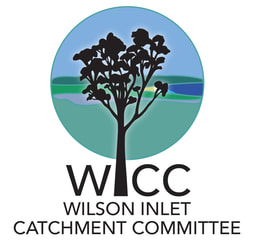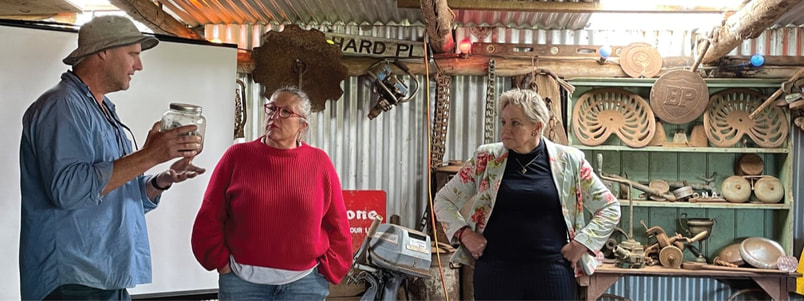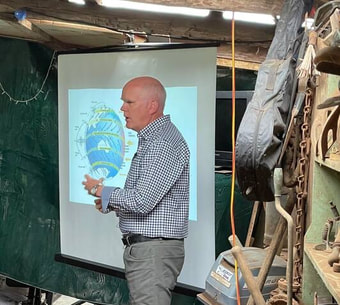Pasture for a changing climate
The Wilson Inlet Growers Group (WIGG) recently met to explore the best pasture species to suit our changing climate. We were fortunate to have retired meteorologist, Neil Bennet present on climate trends. This was followed by Paul Sanford, a pasture researcher from the Department of Primary Industries and Regional Development (DPIRD) whom spoke on the latest research and trends in pasture species to suit our changing climate.
Neil told WIGG that the primary influence on our climate in our catchment is the Indian Ocean Dipole (IOD). The Southern Annular Mode (SAM) and Southern Oscillation Index (SOI) can also influence our local climate but to a lesser degree. Neil said that a ‘negative’ IOD, SOI or SAM tend to drive an increase in rain. The trend towards a late break to our winter rains and more summer rains is likely to continue under our changing climate. Neil mentioned that land clearing is often more responsible for a reduced rainfall than climate change (at least for now). The reason is the trees cool the ground making rainfall more likely. They also transpire their moisture as part of the water cycle.
Paul spoke on maintaining a balance of annual and perennial based pastures. Perennials such as kikuyu can take advantage of our intermittent summer rains (which have actually increased) meaning there is more fresh fodder for grazing stock across the summer months. While kikuyu does not have the nutritional value of an annual like rye grass, it serves a purpose in keeping your soil covered and retaining moisture in the summer months. Paul said his research suggests that a sheep grazer in Mt Barker receiving 656 mm of rain could expect to increase their gross profit margins by around 10% by adding 25% perennials to an annual pasture. Legumes such as subterranean clover are also a winner. Kikuyu with a high clover content has been shown to increase gross profit margins by nearly 40% (12 ewes to the hectare). The clover is also a great way of naturally increasing soil nitrogen fertility. Typically clover fixes atmospheric nitrogen via its root nodules and when it dies or is eaten much of this nitrogen returns to the soil and becomes available to non-legumes such as grasses.
Diversifying your pasture species so there is green feed all year is the key to maximising your productivity and profit. This provides environmental benefits as well because there is pasture growing across more of the year which is able to take up soil nutrients and maximise the use of rainfall. Keeping your soil covered also reduces erosion (which can export Phosphorous to our inlet) and helps to maintain good soil biology.
WIGG is funded in part by the Western Australian Government’s State Natural Resource Management Program.
Neil told WIGG that the primary influence on our climate in our catchment is the Indian Ocean Dipole (IOD). The Southern Annular Mode (SAM) and Southern Oscillation Index (SOI) can also influence our local climate but to a lesser degree. Neil said that a ‘negative’ IOD, SOI or SAM tend to drive an increase in rain. The trend towards a late break to our winter rains and more summer rains is likely to continue under our changing climate. Neil mentioned that land clearing is often more responsible for a reduced rainfall than climate change (at least for now). The reason is the trees cool the ground making rainfall more likely. They also transpire their moisture as part of the water cycle.
Paul spoke on maintaining a balance of annual and perennial based pastures. Perennials such as kikuyu can take advantage of our intermittent summer rains (which have actually increased) meaning there is more fresh fodder for grazing stock across the summer months. While kikuyu does not have the nutritional value of an annual like rye grass, it serves a purpose in keeping your soil covered and retaining moisture in the summer months. Paul said his research suggests that a sheep grazer in Mt Barker receiving 656 mm of rain could expect to increase their gross profit margins by around 10% by adding 25% perennials to an annual pasture. Legumes such as subterranean clover are also a winner. Kikuyu with a high clover content has been shown to increase gross profit margins by nearly 40% (12 ewes to the hectare). The clover is also a great way of naturally increasing soil nitrogen fertility. Typically clover fixes atmospheric nitrogen via its root nodules and when it dies or is eaten much of this nitrogen returns to the soil and becomes available to non-legumes such as grasses.
Diversifying your pasture species so there is green feed all year is the key to maximising your productivity and profit. This provides environmental benefits as well because there is pasture growing across more of the year which is able to take up soil nutrients and maximise the use of rainfall. Keeping your soil covered also reduces erosion (which can export Phosphorous to our inlet) and helps to maintain good soil biology.
WIGG is funded in part by the Western Australian Government’s State Natural Resource Management Program.


